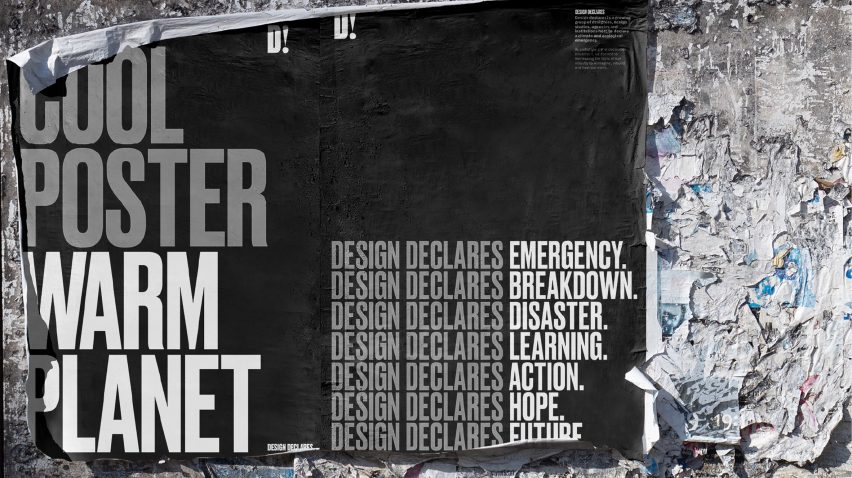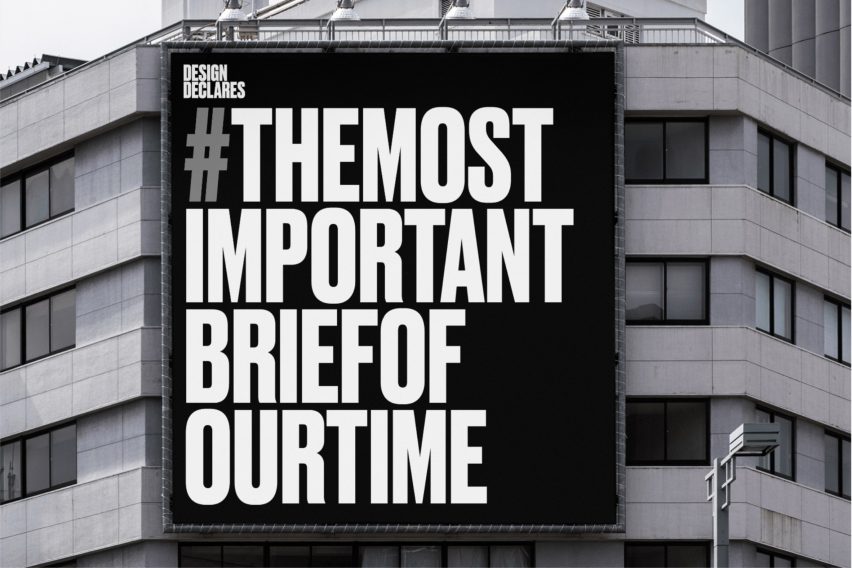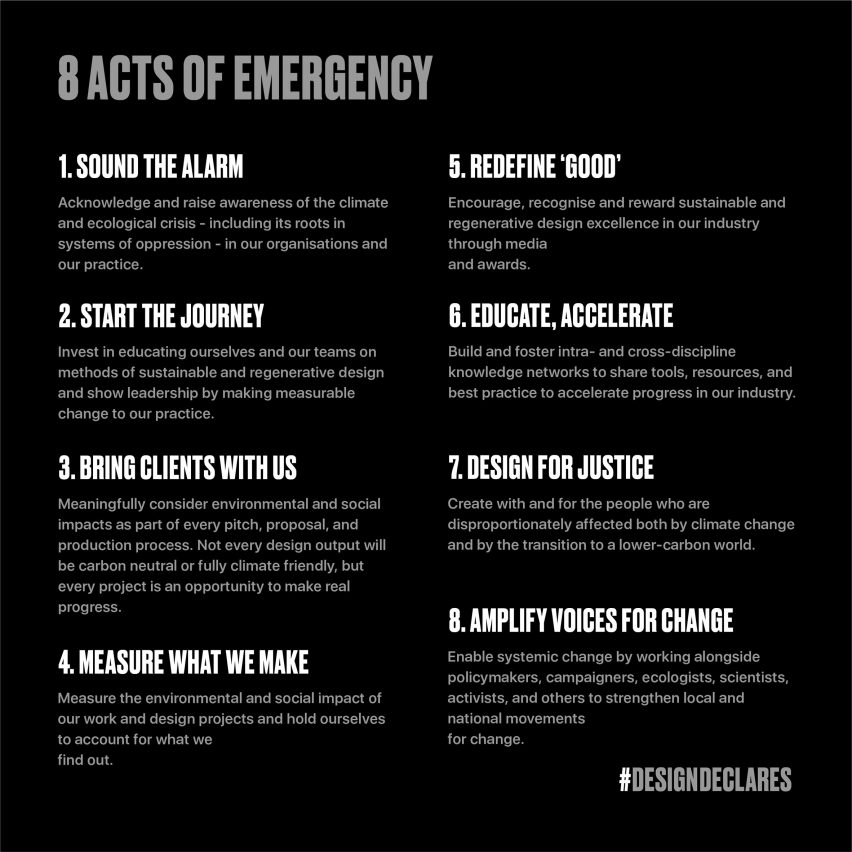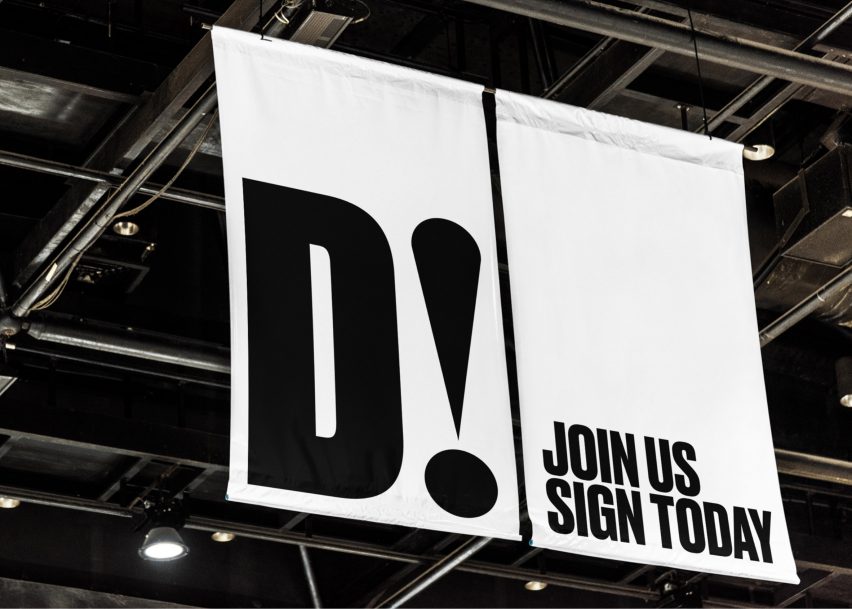
Design Declares campaign unites studios "fed up" with industry's lack of climate action
London studio Pearson Lloyd and Britain's Design Council are among the founding signatories of Design Declares, a new campaign launched at London Design Festival to help UK designers tackle their environmental footprint.
Following on from adjacent industry campaigns such as Architects Declare, the initiative encourages studios from across the fields of digital, industrial, communication and service design to come together to declare a climate emergency.
The eight founding signatories have also committed themselves to start measuring their own footprint and engage clients in discussions around climate change, using eight "acts of emergency" as a starting point.

By the beginning of November, the organisers – led by product design studio Morrama and environmental collective URGE – hope to build a community of 1,000 signatories from across the UK, who the organisers described as "fed up with a lack of industry momentum and ready to act on the most defining issue of our times".
"As designers working within an industry driven by consumption and reliant on production, we have to acknowledge that we have a role to play in changing this system," said Morrama's founder Jo Barnard.
"This is the most important brief of our lives."
Industry lacks "institutional leadership"
The eight founding signatories of Design Declares (D!) include industrial design practice Studio Wood, digital product design firm Driftime, London agency Snook and Sophie Thomas's communication design studio Thomas.Matthews.
The launch of the initiative comes three years after the formation of Architects Declare and Engineers Declare in 2019.
This delay is partly down to the design sector's lack of "institutional leadership", according to URGE's Alexie Sommer.
"Architecture and engineering have a series of bodies that help to regulate their industry," she told Dezeen. "But there is no chartership for design in the UK. So who says what is good and who says what is acceptable?"

"It's like we've been having the same conversations for the last 10 years," she added. "And there are still design awards that look at aesthetics and function without considering any other impacts."
However, Sommer says this delay has also given her and her co-organisers the benefit of learning from the critiques and controversies faced by other Declare campaigns.
"We've built on some of the learnings from Architects Declare and Engineers Declare, which started as declarations that were marking a moment," Sommer explained. "But they got criticised because there wasn't much action. So we would like to avoid that."
No concrete carbon goals set for signatories
With this aim, D! has set out a loose set of guidelines, called the "eight acts of emergency", which outline how firms can begin tackling their environmental impact, ranging from measuring their carbon footprint to bringing clients on board.
Each of these points is supported by a toolkit of concrete insights and tools to support signatories in this process.
"If we're looking for paradigm shifts, those need to start with everyone," Sommer said. "We can't rely on government. We can't just rely on industry leadership. We need to start doing things in practices on a daily basis."
"It's a lot about education," she added. "How do I do an impact assessment of the latest website project that I've done? What is the carbon intensity of the digital assets that I'm creating?"
Every six months, D! will check in with signatories on their progress.
However, the campaign does not require them to meet specific carbon reduction targets in line with the net-zero goals, which need to be met in order to limit global warming to the crucial threshold of 1.5 degrees Celsius set out by the UN's Intergovernmental Panel on Climate Change (IPCC).
"The IPCC has asked for a 50 per cent reduction of your 2018 carbon footprint by 2030," Sommer explained. "That's what the global science community has demanded from businesses."
"We could mirror that in design. But most people don't know what their 2018 carbon footprint was. So one of the first asks is to measure what we make."
D! to put united industry demands to government
By 8 November 2022, when the Design Council is hosting its Design for Planet Festival, D! hopes to accumulate a thousand signatories, who will be able to unite their voices behind a set of industry-backed demands that will then be put to the British government.
This will call for top-down regulatory changes to support this bottom-up movement toward decarbonising the design sector.
Currently, the campaign is only accepting signatures from UK studios and freelance designers.

But the organisers are looking at creating international partnerships in countries including France, Portugal and the Netherlands to expand D! around the world.
A number of studios and brands have already started setting concrete goals for eliminating their emissions, despite their lack of historical data.
This includes Danish furniture company Takt, American carpet manufacturer Interface and the London design studio of Sebastian Cox, which he says is already "carbon negative by some long stretch" thanks to making products from locally sourced wood.
London Design Festival 2022 takes place from 17-25 September 2022. See our London Design Festival 2022 guide on Dezeen Events Guide for information about the many other exhibitions, installations and talks taking place throughout the week.